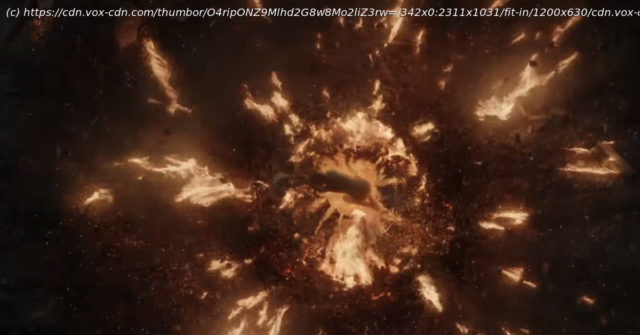Amazon’s Lord of the Rings prequel Rings of Power introduces a mysterious stranger in a meteor hanging out with hobbits. But while it might seem like Gandalf initially, upon review the evidence points elsewhere.
Ever since its announcement, The Lord of the Rings: The Rings of Power has been a subject of mass debate. It’s based on the appendices of Tolkien’s trilogy, as opposed to the trilogy itself, and set during the Second Age, an era for which we have a detailed chronology of historical events but far less knowledge of how said events transpired. And alongside well-loved characters like Elrond and Galadriel, it is introducing its own original players with Arondir, Bronwyn, and more.
One can parse the various strands of lore with the right Tolkien references, but there is one specific element of The Rings of Power that has left both scholars and sockpuppets stumped: the Stranger, or the wizard-like figure who crash-lands in Middle-earth via molten meteorite.
Viewers were first introduced to the Stranger (commonly referred to as Meteor Man) in a trailer for The Rings of Power, during which several figures across Middle-earth could be seen watching a meteorite soar through the sky. Some people think this is The Rings of Power’s Sauron, which is likely wrong. Others are convinced that it’s Gandalf, which also doesn’t add up.
After watching the first two episodes of The Rings of Power, we’ve learned a little bit more about this mysterious figure — although this knowledge has only served to further our conviction that neither the Dark Lord nor Mithrandir is our guy. So, to assess who our magical friend could be, we first need to debunk who it almost certainly isn’t.
One of the main reasons that people are convinced that this is either Gandalf or Sauron is because showrunners Patrick McKay and J.D. Payne all but confirmed it to be a figure of similar status in Vanity Fair’s 10 Burning Questions interview:
Well, I would say [Gandalf, Radagast, and Saruman] are not the only beings, those names, in that class. So maybe, but maybe not. And the mystery and the journey of it is all of the fun, I would say.
This is an interesting answer, because it points to the other “beings” and “names” of the class the wizards — known as Istari — share: They are all Maiar, meaning they’re sort of like angels. The Valar, who are above them, are closer to gods or celestial beings. To put it as plainly as possible, Meteor Man is probably a Maiar spirit, which is what both Gandalf and Sauron are. But so are the other Istari, including the mysterious Blue Wizards, as well as the Balrogs, among others. Meteor Man could therefore be one of many people — that’s not to mention the possibility he could also be a totally original character.
But again, the best course of action here is to argue why it probably isn’t Sauron and definitely isn’t Gandalf. The former returns to Middle-earth 500 years into the Second Age, skulking around like a bad smell. After his master’s defeat in the First Age, Sauron is forced to rebuild his power and army discreetly, so rocketing his way back to Middle-earth in a literal fireball would probably be pretty counterintuitive. In Tolkien’s writing, he returns as Annatar, dubbed the “Lord of Gifts,” and tricks the Elves of Eregion into forging the Rings of Power — which, you know, is kind of the name of the show, and therefore likely to be an important part of it.
There is an argument that viewers will recognize “Annatar” as Sauron the deceiver, and so the onus may be on Amazon to introduce him in a different way. Some people think that Halbrand, Galadriel’s new pal, will end up becoming the Dark Lord in his stead. It’s not the cleverest theory — Galadriel is the only person in Eregion to distrust Annatar in the books, so having her be the one who is betrayed in the show would be a disservice to her character. Obviously, an idea being bad does not completely discount it from being realized — but McKay and Payne have proven time and time again that they are avid Tolkien fans first and foremost, so while certain liberties might be taken in response to the established lore, it’s unlikely that it will be totally dismissed.






